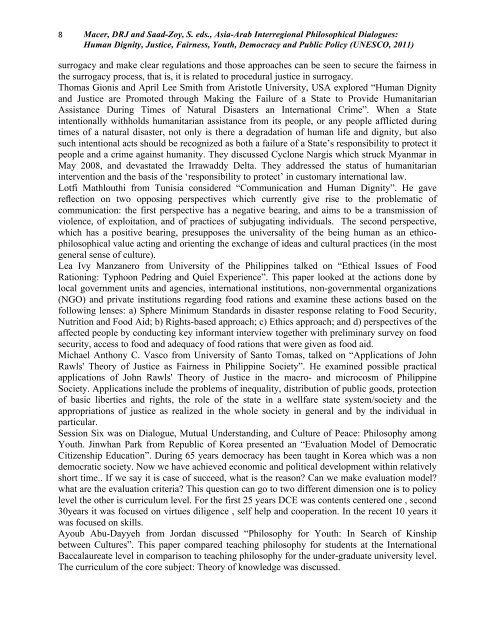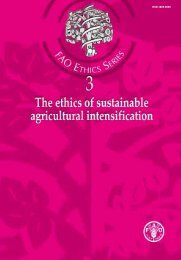Human Dignity, Justice, Fairness, Youth - Eubios Ethics Institute
Human Dignity, Justice, Fairness, Youth - Eubios Ethics Institute
Human Dignity, Justice, Fairness, Youth - Eubios Ethics Institute
Create successful ePaper yourself
Turn your PDF publications into a flip-book with our unique Google optimized e-Paper software.
8 <br />
Macer, DRJ and Saad-Zoy, S. eds., Asia-Arab Interregional Philosophical Dialogues:<br />
<strong>Human</strong> <strong>Dignity</strong>, <strong>Justice</strong>, <strong>Fairness</strong>, <strong>Youth</strong>, Democracy and Public Policy (UNESCO, 2011)<br />
surrogacy and make clear regulations and those approaches can be seen to secure the fairness in<br />
the surrogacy process, that is, it is related to procedural justice in surrogacy.<br />
Thomas Gionis and April Lee Smith from Aristotle University, USA explored “<strong>Human</strong> <strong>Dignity</strong><br />
and <strong>Justice</strong> are Promoted through Making the Failure of a State to Provide <strong>Human</strong>itarian<br />
Assistance During Times of Natural Disasters an International Crime”. When a State<br />
intentionally withholds humanitarian assistance from its people, or any people afflicted during<br />
times of a natural disaster, not only is there a degradation of human life and dignity, but also<br />
such intentional acts should be recognized as both a failure of a State’s responsibility to protect it<br />
people and a crime against humanity. They discussed Cyclone Nargis which struck Myanmar in<br />
May 2008, and devastated the Irrawaddy Delta. They addressed the status of humanitarian<br />
intervention and the basis of the ‘responsibility to protect’ in customary international law.<br />
Lotfi Mathlouthi from Tunisia considered “Communication and <strong>Human</strong> <strong>Dignity</strong>”. He gave<br />
reflection on two opposing perspectives which currently give rise to the problematic of<br />
communication: the first perspective has a negative bearing, and aims to be a transmission of<br />
violence, of exploitation, and of practices of subjugating individuals. The second perspective,<br />
which has a positive bearing, presupposes the universality of the being human as an ethicophilosophical<br />
value acting and orienting the exchange of ideas and cultural practices (in the most<br />
general sense of culture).<br />
Lea Ivy Manzanero from University of the Philippines talked on “Ethical Issues of Food<br />
Rationing: Typhoon Pedring and Quiel Experience”. This paper looked at the actions done by<br />
local government units and agencies, international institutions, non-governmental organizations<br />
(NGO) and private institutions regarding food rations and examine these actions based on the<br />
following lenses: a) Sphere Minimum Standards in disaster response relating to Food Security,<br />
Nutrition and Food Aid; b) Rights-based approach; c) <strong>Ethics</strong> approach; and d) perspectives of the<br />
affected people by conducting key informant interview together with preliminary survey on food<br />
security, access to food and adequacy of food rations that were given as food aid.<br />
Michael Anthony C. Vasco from University of Santo Tomas, talked on “Applications of John<br />
Rawls' Theory of <strong>Justice</strong> as <strong>Fairness</strong> in Philippine Society”. He examined possible practical<br />
applications of John Rawls' Theory of <strong>Justice</strong> in the macro- and microcosm of Philippine<br />
Society. Applications include the problems of inequality, distribution of public goods, protection<br />
of basic liberties and rights, the role of the state in a wellfare state system/society and the<br />
appropriations of justice as realized in the whole society in general and by the individual in<br />
particular.<br />
Session Six was on Dialogue, Mutual Understanding, and Culture of Peace: Philosophy among<br />
<strong>Youth</strong>. Jinwhan Park from Republic of Korea presented an “Evaluation Model of Democratic<br />
Citizenship Education”. During 65 years democracy has been taught in Korea which was a non<br />
democratic society. Now we have achieved economic and political development within relatively<br />
short time.. If we say it is case of succeed, what is the reason? Can we make evaluation model?<br />
what are the evaluation criteria? This question can go to two different dimension one is to policy<br />
level the other is curriculum level. For the first 25 years DCE was contents centered one , second<br />
30years it was focused on virtues diligence , self help and cooperation. In the recent 10 years it<br />
was focused on skills.<br />
Ayoub Abu-Dayyeh from Jordan discussed “Philosophy for <strong>Youth</strong>: In Search of Kinship<br />
between Cultures”. This paper compared teaching philosophy for students at the International<br />
Baccalaureate level in comparison to teaching philosophy for the under-graduate university level.<br />
The curriculum of the core subject: Theory of knowledge was discussed.

















